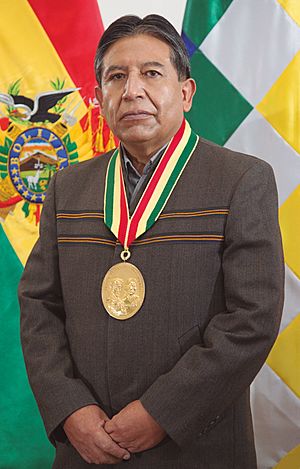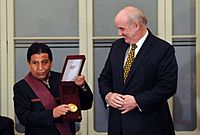David Choquehuanca facts for kids
Quick facts for kids
The Most Excellent
David Choquehuanca
MROU OSP
|
|
|---|---|

Official portrait, 2020
|
|
| 39th Vice President of Bolivia | |
| Assumed office 8 November 2020 |
|
| President | Luis Arce |
| Preceded by | Álvaro García Linera |
| Secretary General of ALBA | |
| In office 5 March 2017 – 15 November 2019 |
|
| Preceded by | Bernardo Álvarez |
| Succeeded by | Sacha Llorenti |
| Minister of Foreign Affairs | |
| In office 23 January 2006 – 23 January 2017 |
|
| President | Evo Morales |
| Preceded by | Armando Loaiza |
| Succeeded by | Fernando Huanacuni |
| Personal details | |
| Born |
David Choquehuanca Céspedes
7 May 1961 Cota Cota Baja, La Paz, Bolivia |
| Political party | Movement for Socialism |
| Spouse | Lidia Gutiérrez |
| Alma mater | Simón Bolívar Higher Teacher Training School Niceto Pérez Cadre Training School |
| Occupation |
|
| Signature |  |
David Choquehuanca Céspedes (born 7 May 1961) is a Bolivian politician and leader. He has been the 39th vice president of Bolivia since 2020. He is a member of the Movement for Socialism party.
Before becoming vice president, he was Bolivia's Minister of Foreign Affairs from 2006 to 2017. He also served as the Secretary General of ALBA, a group of Latin American countries, from 2017 to 2019.
David Choquehuanca is from the Aymara indigenous group. He grew up involved in movements for farmers and indigenous people. He worked closely with former president Evo Morales to create the Movement for Socialism party.
Contents
Early Life and Education
Growing Up in Bolivia
David Choquehuanca was born on 7 May 1961. His hometown was Cota Cota Baja, a small village near Lake Titicaca in Bolivia. He is Aymara and learned to speak the Aymara language first. He learned Spanish when he was seven years old.
His father, Nicolás Choquehuanca, was a well-known leader for farmers in their area. David learned important skills like weaving, planting, and fishing from his father.
School Days
Choquehuanca finished his first years of school in his village. In 1971, he moved to Huarina for high school. He graduated in 1980.
At school, his philosophy teacher introduced him to ideas about how society should work. These ideas inspired him to want to bring about change. He helped start his school's first student group and took part in protests.
After high school, he studied philosophy in La Paz. He also received a scholarship to study in Havana, Cuba, in 1985. There, he learned more about philosophy and economics. Later, he studied history and anthropology. He also earned a degree in indigenous rights.
Working for Farmers' Rights
In the 1980s, Choquehuanca became very active in the peasant labor movement. This movement worked for the rights of farmers. He joined many strikes and meetings for workers.
In 1984, he met Evo Morales, who was an activist for coca farmers. Together, they helped create the idea for a "political tool" to represent farmers. This idea later became the Movement for Socialism (MAS-IPSP) party.
From 1998 to 2005, Choquehuanca led the Nina Program. This was a group that trained and educated leaders for the indigenous farmer movement. He also advised many indigenous groups and leaders, including Evo Morales. He was asked to run for different political jobs but chose to focus on his work with the movement.
Minister of Foreign Affairs
After Evo Morales was elected president in 2005, he chose David Choquehuanca to be Bolivia's Minister of Foreign Affairs. This meant Choquehuanca would be Bolivia's main diplomat to other countries. He was the first indigenous person to hold this important position in Bolivia.
Choquehuanca served as foreign minister for eleven years. This was the longest time anyone had held that job in Bolivia's history. He became one of the most important people in President Morales's government. Many saw him as the third most powerful figure, after Morales and Vice President Álvaro García Linera.
As foreign minister, Choquehuanca focused on supporting indigenous people's ideas within the government. He helped show the world an image of Bolivia that celebrated its indigenous culture. During his time, Bolivia changed how it worked with the United States, including the US ambassador leaving. He also made stronger connections with some neighboring countries. He led Bolivia's legal case against Chile at an international court.
Over time, there were some disagreements between Choquehuanca and other parts of the government. Especially with those who supported Vice President García Linera. After a vote in 2016 did not allow Morales to run for president again, Choquehuanca was seen as a possible future president. This caused tension with President Morales.
In January 2017, President Morales replaced Choquehuanca as foreign minister. Choquehuanca was then appointed Secretary General of the Bolivarian Alliance (ALBA). This new role was seen by some as a way to move him away from the main political scene in Bolivia.
Vice President
After President Morales stepped down in 2019, new elections were planned for 2020. David Choquehuanca was seen as a strong candidate for president by many groups. These groups included farmer organizations and trade unions. They chose him as their preferred presidential candidate.
However, Evo Morales, who was outside Bolivia at the time, chose former finance minister Luis Arce to run for president. Choquehuanca was then chosen as Arce's running mate for vice president. Some groups were upset that their choice for president was not picked. But Choquehuanca asked everyone to accept Morales's decision.
The Arce-Choquehuanca team won the 2020 election with 55% of the votes. David Choquehuanca became the Vice President of Bolivia in November 2020. He is the second indigenous vice president in the country's history. Since becoming vice president, Choquehuanca has gained more influence within his party. Some people in the party now want him to be the next presidential candidate.
Electoral History
| Year | Office | Party | Votes | Result | Ref. | |||
|---|---|---|---|---|---|---|---|---|
| Total | % | P. | ||||||
| 2020 | Vice president | Movement for Socialism | 3,393,978 | 55.10% | 1st | Won | ||
| Source: Plurinational Electoral Organ | Electoral Atlas | ||||||||
Distinctions
| Award or decoration | Country | Date | Ref. | |
|---|---|---|---|---|
| Medal of the Oriental Republic of Uruguay | 2006 | |||
| Grand Cross of the Order of the Sun of Peru | 2010 | |||
See also
 In Spanish: David Choquehuanca para niños
In Spanish: David Choquehuanca para niños
 | James B. Knighten |
 | Azellia White |
 | Willa Brown |


